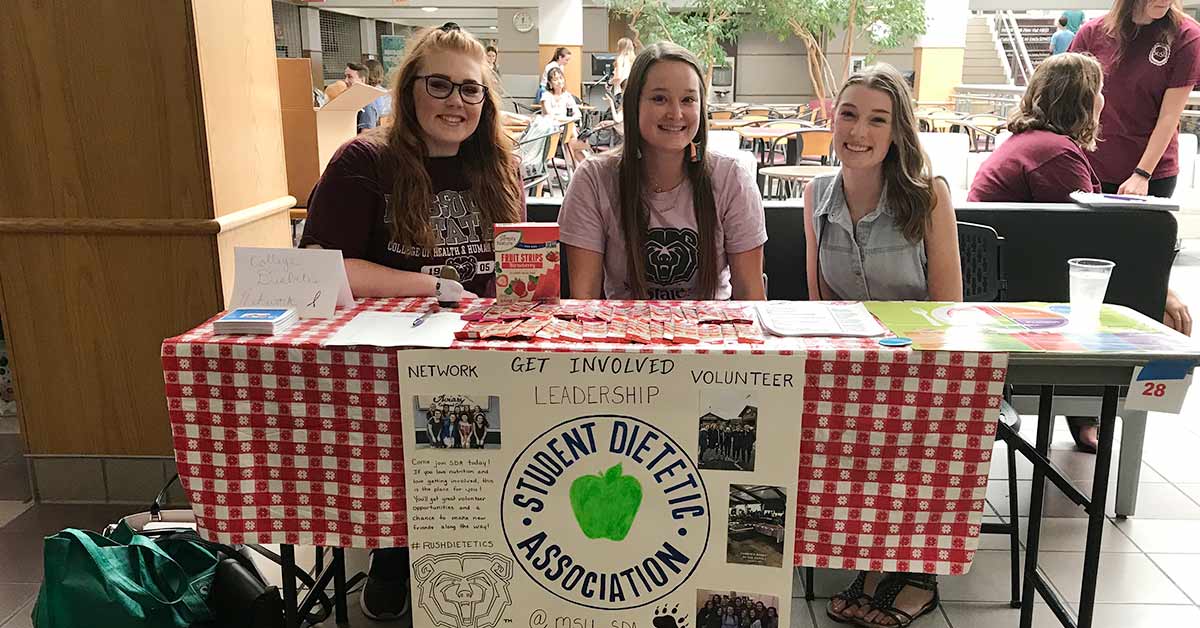Eating a cheeseburger or pizza won’t ruin your diet.
Meghan McGaw, a nutrition and dietetics major, can tell you why.
As the saying goes: All foods can fit.
“You can eat anything in moderation. An excess of anything can make you gain weight. It’s just the idea of balance,” she said. “You can eat healthier some days, less healthy other days and still maintain whatever your goals are. If you’re too restrictive, you’re never going to follow any sort of pattern or plan.
“You should enjoy eating your favorite foods.”
Some people struggle to keep a balanced diet, which can lead to disease and poor health.
That’s where dietitians come in.
They study the science of food and provide a key service in health care.
“There’s so much we can do to prevent and treat disease through the way that we eat, so I love being able to help people that way,” said McGaw, who also serves as president of the Student Dietetic Association (SDA). “I just think the science of nutrition and food is so cool.”
‘We love food, and we get to study food every day’

All programs in the biomedical sciences department – including nutrition and dietetics – emphasize lab work.
Some days, you get to wear your chef’s hat.
In DTN 330 (Food Selection and Preparation for Health), students like McGaw put their spin on common recipes.
“I really enjoy my dietetics classes. It feels like I’m really involved in what I’m going to be doing and I’m learning a lot.”
“We cook in the lab once a week and we all get to try similar variations of recipes or techniques,” she said. “We’re broken into groups, and we all make something and get to try it. Everyone enjoys that class.
“You’re trying new techniques, so it always feels good when you don’t mess it up. And you have something good to serve the class.”
McGaw’s favorite foods to make – in or out of class – include:
- Avocado toast.
- Chicken anything (fajitas, pesto pasta, teriyaki).
- Vegan banana pudding.
“I always say, ‘Good food equals good mood,’” McGaw said.
McGaw is also involved in dietetics away from class.
McGaw has been in the SDA since her freshman year. She’s also done service-learning projects at Bear Pantry and Urban Roots Farm.
“I’ve made my closest friends through dietetics and built good relationships,” McGaw said.
An extra incentive to attend Missouri State
When making her college decision, McGaw said it came down to Missouri State or a four-year school in her home state.
Under the Midwest Student Exchange Program (MSEP), Missouri State ended up being the more affordable choice for the Kansas native.
The MSEP allows qualified students from participating states to receive an in-state tuition rate.
“I’m from the Kansas side of Kansas City, but Missouri State still gives me the in-state tuition rate thanks to that program,” McGaw said. “If I had to pay out-of-state tuition, I could not have afforded (MSU). With the (MSEP), Missouri State actually costs less than Kansas State.”
During her campus visit, McGaw met with nutrition and dietetics program director, Sarah Murray.
McGaw now has Murray as her advisor.
“What really sold me was touring the fourth floor of (Kampeter) with Sarah and meeting with her in her office and being able to ask my questions,” McGaw said. “I was able to see where I would spend the next four years. I knew I was going to be more connected and wouldn’t just be another number.”
Career goals are TBD
For graduate school, McGaw plans to follow a family tradition: Attend Kansas University in her home state.
She wants to complete her dietetic internship and master’s degree at KU’s medical school.
The internship will help McGaw become a Registered Dietitian Nutritionist (RDN) – a certified expert on food, diet and nutrition.
McGaw isn’t quite sure yet what she wants to do within dietetics.
That’s understandable – there’s a lot to choose from.
“That’s the beauty of dietetics: You can work in almost any industry nowadays,” she said. “You can work corporate, clinical, food service, community, outpatient or long-term care.”
McGaw has worked in different nutritional roles at a nursing home. She could see herself getting into outpatient or long-term care.
“I really like the idea of getting to know my patients and having them long term,” McGaw said. “I like developing that relationship.”

